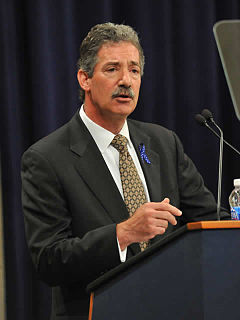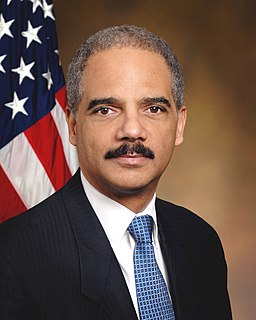A shield law is legislation designed to protect reporters' privilege. This privilege involves the right of news reporters to refuse to testify as to information and/or sources of information obtained during the news gathering and dissemination process. Currently the U.S. federal government has not enacted any national shield laws, but most of the 50 states do have shield laws or other protections for reporters in place.
The CIA leak grand jury investigation was a federal inquiry "into the alleged unauthorized disclosure of a Central Intelligence Agency (CIA) employee's identity", a possible violation of criminal statutes, including the Intelligence Identities Protection Act of 1982, and Title 18, United States Code, Section 793.

The following are controversial invocations of the USA PATRIOT Act. The stated purpose of the Act is to "deter and punish terrorist acts in the United States and around the world, to enhance law enforcement investigatory tools, and for other purposes." One criticism of the Act is that "other purposes" often includes the detection and prosecution of non-terrorist alleged future crimes.

James Risen is an American journalist for The Intercept. He previously worked for The New York Times and before that for Los Angeles Times. He has written or co-written many articles concerning U.S. government activities and is the author or co-author of two books about the Central Intelligence Agency (CIA) and a book about the American public debate about abortion. Risen is a Pulitzer Prize winner.

James C. Goodale was the former vice president and general counsel for The New York Times and, later, the Times' vice chairman.
The Reporters Committee for Freedom of the Press (RCFP) The Reporters Committee for Freedom of the Press is a nonprofit organization based in Washington, D.C., that provides pro bono legal services and resources to and on behalf of journalists. The Reporters Committee attorneys pursue litigation, offers direct representations, regularly submits amicus briefs, and provides other legal assistance on matters involving the First Amendment, press freedom, freedom of information, and court access issues. Through this work, the organization serves a large network of news organizations, reporters, editors, media lawyers and others who need pro bono legal support.
Lance Williams and Mark Fainaru-Wada co-authored the book Game of Shadows while they were reporters for the San Francisco Chronicle. For their investigative work in the field of steroids, Williams and Fainaru-Wada were given the 2004 George Polk Award.
Reporter's privilege in the United States, is a "reporter's protection under constitutional or statutory law, from being compelled to testify about confidential information or sources." It may be described in the US as the qualified (limited) First Amendment or statutory right many jurisdictions have given to journalists in protecting their confidential sources from discovery.
On December 7, 2006, the George W. Bush administration's Department of Justice ordered the midterm dismissal of seven United States Attorneys. Congressional investigations focused on whether the Department of Justice and the White House were using the U.S. Attorney positions for political advantage. Allegations were that some of the attorneys were targeted for dismissal to impede investigations of Republican politicians or that some were targeted for their failure to initiate investigations that would damage Democratic politicians or hamper Democratic-leaning voters. The U.S. attorneys were replaced with interim appointees, under provisions in the 2005 USA PATRIOT Act reauthorization.
The Free Flow of Information Act is a bill intended to provide a news reporter with the right to refuse to testify as to information or sources of information obtained during the newsgathering and dissemination process.

James Michael Cole is an American attorney who served as United States Deputy Attorney General from December 29, 2010 to January 8, 2015. He was first installed as Deputy Attorney General following a recess appointment by President Barack Obama on December 29, 2010. He then was confirmed by the United States Senate in a 55–42 vote on June 28, 2011.

James Samuel Rosen is an American journalist and television correspondent, who worked as a Washington, D.C., correspondent for the Fox News Channel.
The WikiLeaks-related Twitter court orders were United States Department of Justice 2703(d) orders accompanied by gag orders issued to Twitter in relation to ongoing investigations of WikiLeaks issued on 14 December 2010. While only five people were individually named within the subpoena, according to lawyer Mark Stephens the order effectively entailed the collection in relation to criminal prosecution of the personal identifying information of over six hundred thousand Twitter users, principally those who were followers of WikiLeaks. The U.S. government also sent Twitter a subpoena for information about Julian Assange and several other WikiLeaks-related persons, including Chelsea Manning. Twitter appealed against the accompanying gag order in order to be able to disclose its existence to its users, and was ultimately successful in its appeal. Subsequent reactions included the discussion of secret subpoenas in the U.S., criticism of the particular subpoena issued, an immediate, temporary 0.5 percent reduction in the number of Twitter followers of WikiLeaks, and calls for the recognition and emulation of Twitter's stance.

"Gunwalking", or "letting guns walk", was a tactic of the Arizona Field Office of the United States Bureau of Alcohol, Tobacco, Firearms and Explosives (ATF), which ran a series of sting operations between 2006 and 2011 in the Tucson and Phoenix area where the ATF "purposely allowed licensed firearms dealers to sell weapons to illegal straw buyers, hoping to track the guns to Mexican drug cartel leaders and arrest them". These operations were done under the umbrella of Project Gunrunner, a project intended to stem the flow of firearms into Mexico by interdicting straw purchasers and gun traffickers within the United States. The Jacob Chambers Case began in October 2009 and eventually became known in February 2010 as "Operation Fast and Furious" after agents discovered Chambers and the other suspects under investigation belonged to a car club.
Jana Winter is an American reporter best known for being first to report that James Holmes had sent a notebook to his University of Colorado psychiatrist Lynn Fenton with details about his premeditated plan to kill people before he allegedly did so. She joined The Intercept in 2014 and worked there through January 2016. Previously she had been a reporter from 2006 to 2008 for the New York Post, and from 2008 to 2014 for Fox News Channel.

Matt Apuzzo is an American journalist. He is a two-time Pulitzer Prize winner for The New York Times.

Peter Paul Strzok II is a former United States Federal Bureau of Investigation (FBI) agent. Strzok was the Chief of the Counterespionage Section and led the FBI's investigation into Hillary Clinton's use of a personal email server.















